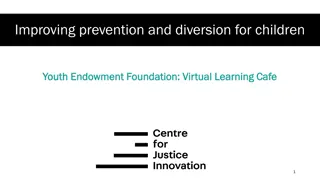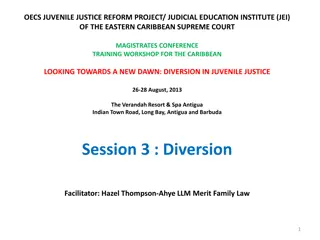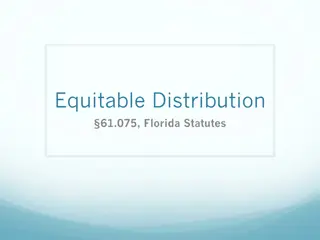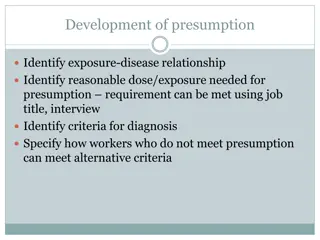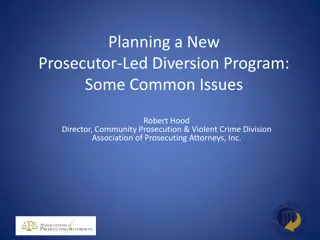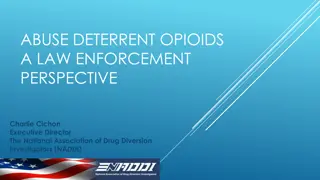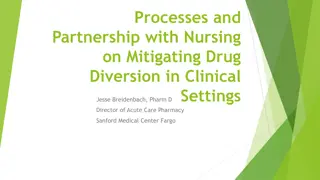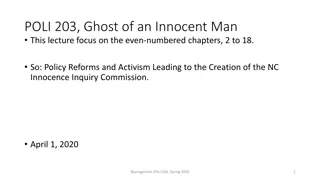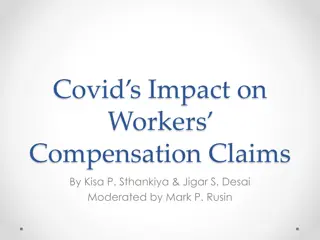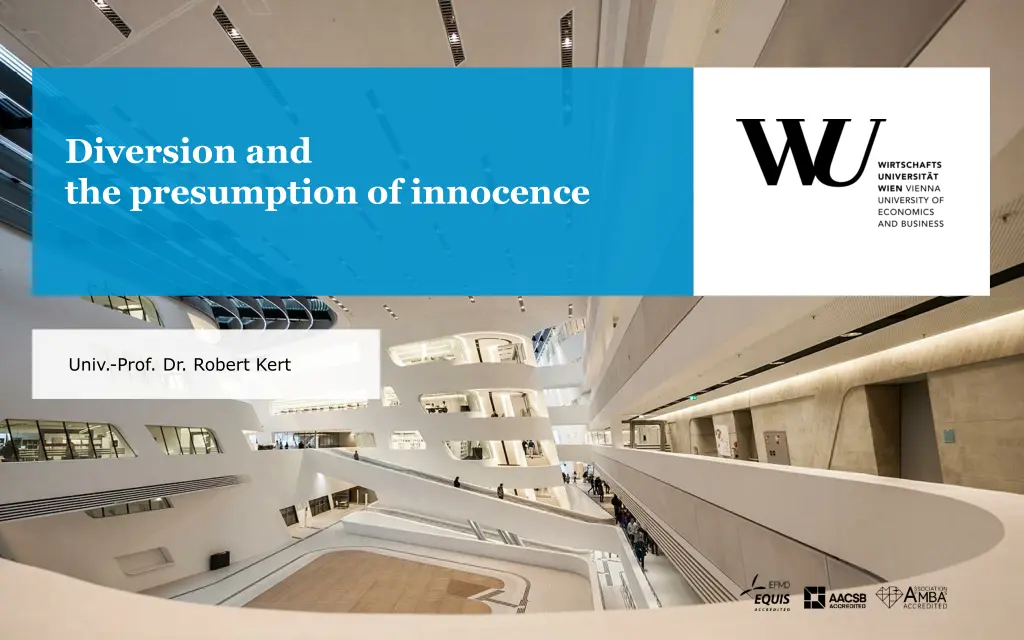
Understanding Diversion and the Presumption of Innocence in Criminal Law Systems
Explore the concept of diversion in criminal law systems, which allows for the dismissal of criminal cases without trial or conviction, while also considering the implications for the presumption of innocence. Learn about the requirements, advantages, and potential conflicts between diversionary measures and the principle of innocence.
Uploaded on | 2 Views
Download Presentation

Please find below an Image/Link to download the presentation.
The content on the website is provided AS IS for your information and personal use only. It may not be sold, licensed, or shared on other websites without obtaining consent from the author. If you encounter any issues during the download, it is possible that the publisher has removed the file from their server.
You are allowed to download the files provided on this website for personal or commercial use, subject to the condition that they are used lawfully. All files are the property of their respective owners.
The content on the website is provided AS IS for your information and personal use only. It may not be sold, licensed, or shared on other websites without obtaining consent from the author.
E N D
Presentation Transcript
Diversion and the presumption of innocence Univ.-Prof. Dr. Robert Kert
Introduction In many criminal law systems: instruments of dismissing criminal cases without criminal trial and/or sentence No conviction and no guilty verdict Various directions and measures must be fulfilled by the accused person before the settlement of the proceeding SEITE 2 FUSSZEILE
What is diversion? Withdrawal from prosecution by the public prosecutor (or the court) without a judgement, especially in less severe cases No decriminalisation of offences A less formal and more socially constructive consequence No registration in criminal records (sometimes internal register of public prosecution authorities) Fulfilment of conditions or directions required, as e.g. Payment of amount of money Community service Victim-offender mediation SEITE 3 FUSSZEILE
Requirements for diversion Limits regarding the seriousness of the criminal offence (e.g. misdemeanors, certain penalty thresholds) Offence has not caused the death of a person Certain degree of the offender s guilt (no serious guilt) The imposition of a penalty is not necessary for special preventive or general preventive reasons. SEITE 4 FUSSZEILE
Diversion advantages No extensive main proceedings Possibilty to order socially constructive measures instead of fines or custodial sentences Avoids a conviction (no criminal record) Facilitates re-socialisation of the offender But: Are such instruments of non-prosecution in line with the presumption of innocence? SEITE 5 FUSSZEILE
Presumption of innocence Diversionary measures are imposed, as for example: Payment of an amount of money to the state or a non-profit making institution Rendering of community service Taking part in and successful fulfilment of a victim-offender mediation Participation in a social skills training Measures constitute a burden for the accused, but there is no guilty verdict Violation of presumption of innocence? How can this tension be resolved? SEITE 6 FUSSZEILE
Presumption of innocence diversion No guilty verdict, no conviction presumption of innocence is maintained: Person concerned is regarded innocent Diversionary measures are no penalty resulting from a court conviction The accused voluntarily accepts the burden of the diversionary measure in order to avoid a conviction Diversion constitutes a procedural option in favor (otherwise criminal proceedings are continued) and puts the accused in a better position Essential is a voluntary decision for or against accepting the diversion offer (by the accused) SEITE 7 FUSSZEILE
Presumption of innocence diversion Problems and challenges Problem: Voluntarity is always limited due to the risk of the underlying criminal proceedings Lack of sufficient knowledge of relevant facts and legal issues Facts of the case must be sufficiently clarified Registration of diversional termination of the criminal proceeding No criminal record Only for internal purposes No aggravating circumstance for the determination of a penalty or of procedural arrangements in future criminal proceedings No use as a conviction in annex proceedings under administrative law (e.g. withdrawal of driving licence) SEITE 8 FUSSZEILE
Conclusion There is a tension between diversional withdrawal from proceedings and presumtion of innocence. Since there is no conviction, the presumption of innocence still remains intact; the accused is regarded innocent. Requirements: The accused accepts diversionary measures voluntarily. The facts of the case should be clear. There should be no disadvantages compared to the regular criminal procedure. No futher negative consequences SEITE 9 FUSSZEILE
DEPARTMENT FR FFENTLICHES RECHT UND STEUERRECHT Institut f r sterreichisches und Europ isches Wirtschaftsstrafrecht Welthandelsplatz 1, 1020 Vienna, Austria Univ.-Prof. Dr. Robert Kert T +43 1 313 36-4158 (Sekretariat) F +43 1 313 36 90-5735 robert.kert@wu.ac.at www.wu.ac.at/wirtschaftsstrafrecht SEITE 10 FUSSZEILE







